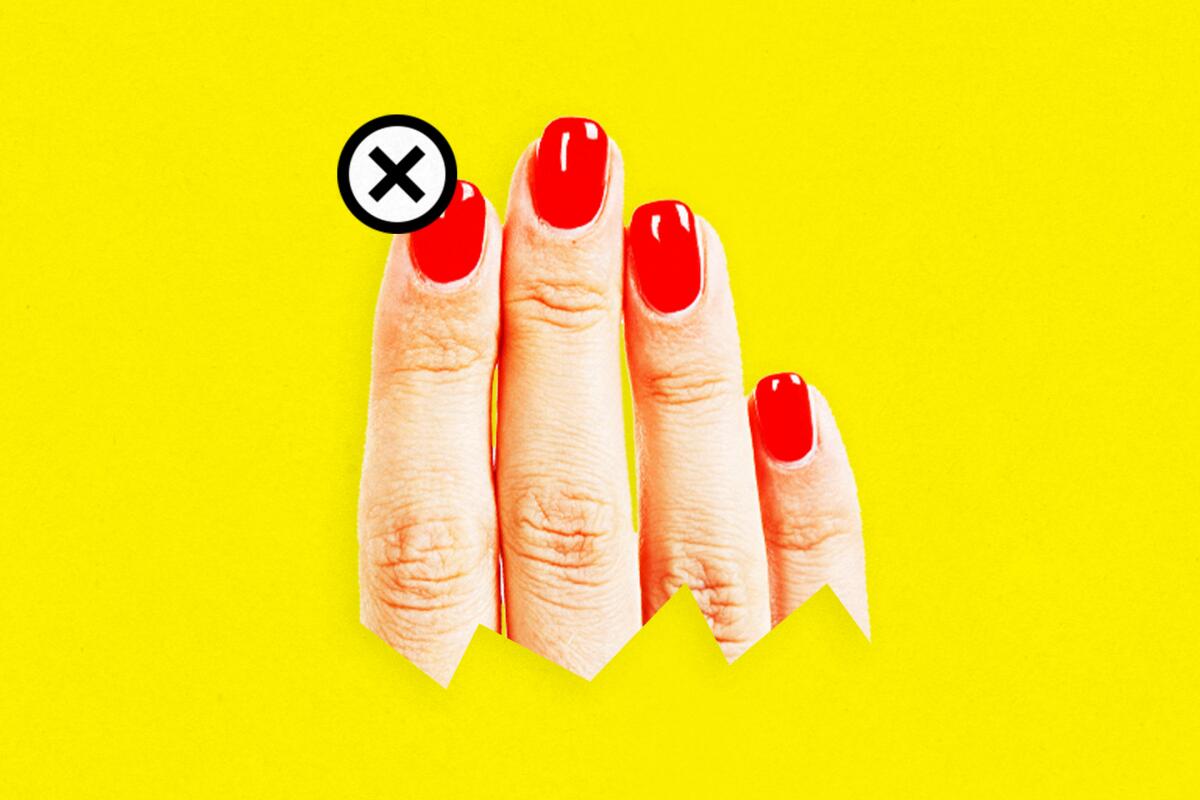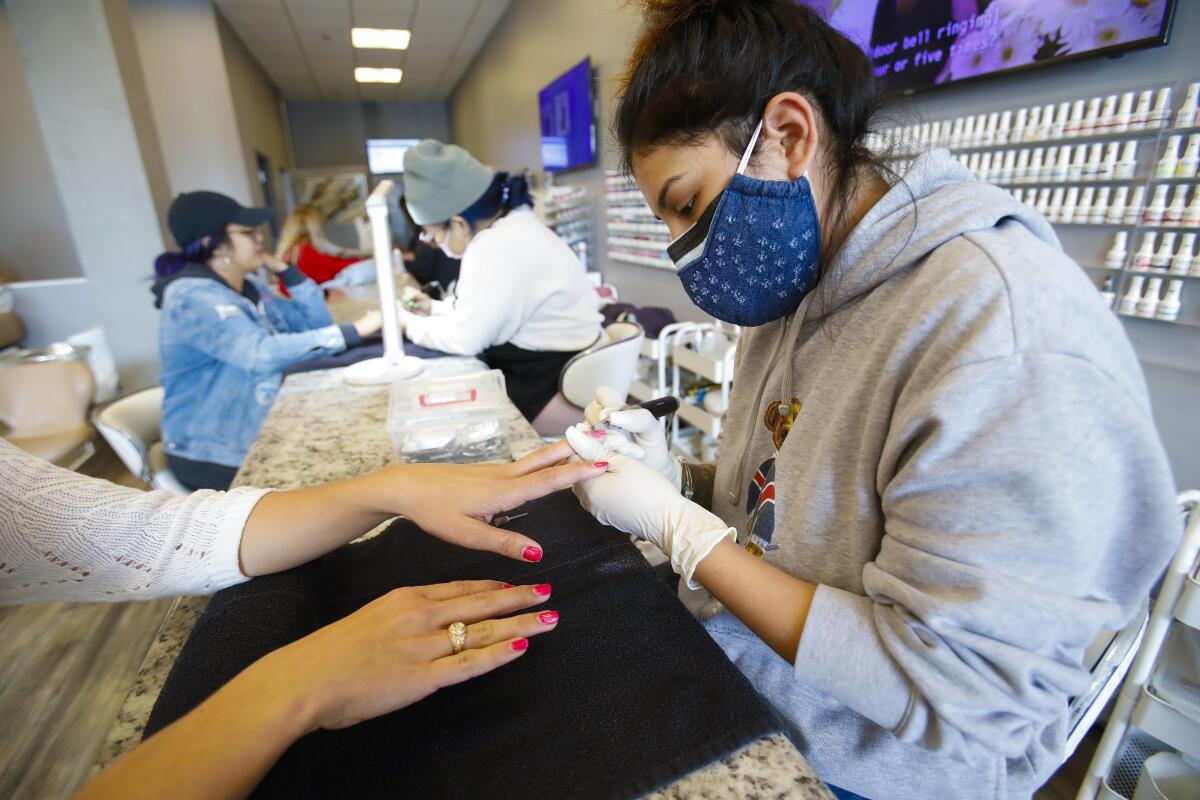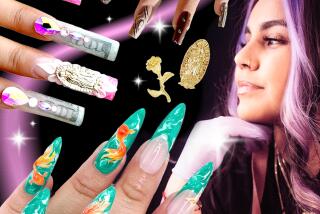How to gently remove your gel manicure and care for your nails at home

Your regular salon manicure is on hiatus with California’s estimated 7,800 nail salons closed because of the “Safer at Home” order. In the coronavirus era, your nail maintenance is now in your own hands.
As you try to replicate the technique of your trusted nail technicians, don’t worry. Doing your own nails at home isn’t impossible. Celebrity manicurist Tom Bachik said you just have to have the right tools, particularly for removing a gel manicure that might be growing out or peeling about now. (Your standard $20 to $25 manicure can be yours at home using a manicure set, which can be found online or at a pharmacy.)
Here are Bachik’s tips for DIY nail and hand care.
Un-gel yourself
Gel manicures are popular for their durability and shine, but the gel polish is generally removed at a nail salon because it can’t be taken off with regular nail polish remover.
“The safest way is to chemically remove it,” said Bachik, who counts Jennifer Lopez, Selena Gomez, Kim Kardashian West, Victoria Beckham and Margot Robbie as regular clients.
Begin the process at home by first filing the top of each nail with a medium to coarse grit file until the shine of the polish is gone. “The shine is really a strong seal that keeps out solvents. You have to remove that shine or [the acetone] almost doesn’t soak up,” he said.
Cut little squares of foil that you’ll wrap around each finger tip. Next, douse cotton balls with pure acetone and place the pieces of cotton on top of each fingernail. Bachik recommends starting with the thumb. Being the biggest nail, it may need more time soaking than the rest of the fingers.
Wrap each nail and the cotton with foil. Keep the cotton and foil on for about five to 10 minutes before removing. The foil traps body heat to make the acetone work more effectively.
After taking everything off, the gel polish should be soft enough to scrape off with an orange stick — or, if you must, a metal scraping tool.
“Metal is fine. If that’s what you have, just be gentle,” Bachik said. “The key is to push in the direction that the nail cells grow. Natural nail cells are layered like shingles on the roof. Start at the cuticle and scrape out and off the nail. If you have to scrape hard, put the cotton back on and let the acetone work for a few more minutes.”
Goodbye, dip
Dip powder manicures have become popular of late. The powder is essentially acrylic and nail glue and can be a bigger challenge to remove on your own than gel polish.
Bachik recommends thinning the dip powder down with a file first and, similarly to removing a gel manicure, soak each nail in acetone for 10 to 15 minutes.
“The key to remember is to be patient. Take your time and allow the remover to work,” he said. “If you’re having to scrape hard to remove the dip powder, then it needs to soak longer. The product should swell and be soft and easily remove without a lot of pressure.”
Bachik created an at-home removal kit to make the process more streamlined.
Hydrated hands
With the constant handwashing and sanitizing, it’s also imperative to keep hands and nails hydrated during the coronavirus crisis.
“Antimicrobial soaps are so dehydrating. Plus this time of year, with seasonal changes, also dries out the hands,” Bachik said. “What I’ve been recommending to a lot of my clients is to use a nice facial oil. Those are great for the hands. They penetrate, are not greasy and [are] good for our skin. Put it on your face and rub it straight into your hands. The key is to keep moisturizing.”
Key cuticle care
It might be tempting to pick at or cut your cuticles out of habit or nerves. However, Bachik warned, the cuticle itself is living tissue that seals and protects against infection. If too much is cut, the body will grow the cuticle back quicker, much like a callous on the foot.
“Push back cuticles very gently. You only want to cut the excess and not get too close to the living tissue,” he said. “Use a cuticle nipper. Tweezerman makes a great one called the Rockhard. And cut. Don’t pull it. Tearing the tissue underneath could potentially become a hangnail.”
Steady strokes
There’s a secret to polishing your own nails, Bachik said. It’s simple: Use the least amount of strokes possible.
Start by cleaning each nail with at least 70% alcohol. Bachik warns that nail-polish removers have oils and lanolin, which can block adhesion of the nail polish. A nail cleaned and dried with alcohol will retain polish longer.

Put the hand down on a hard surface and stabilize it. “The least amount of strokes you use, the smoother the polish is going to be,” the manicurist said. “Otherwise it will start to get gummy and streaky. The goal is three strokes.”
Brush on a base coat. Products that are a top coat/base coat combo are fine, Bachik said. However, ideally you will have a base coat, polish and top coat.
“A base coat works like a double-sided sticky tape,” he said. “It helps polish last longer and helps [prevent] heavily pigmented color from staining the nail.”
Pro hair colorists and stylists in L.A. offer tips and tricks on how to best tend to hair growth during quarantine.
For applying color, Bachik likes to use a technique for which he draws an imaginary line down the center of the nail and does to one side what he does to the other.
Put the brush three-quarters back on the nail toward the cuticle, leave a hair-size margin between color and cuticle, and then take your brush and follow toward the free edge tip of the nail, down to the side and out off the edge. Repeat this on the other side.
“You can practice the technique with a base coat because it’s clear,” Bachik said. “To clean up any color on the skin or cuticle, take an old lip or eyeliner brush, dip it in remover and clean up around the cuticle to remove any excess.” Apply a top coat in the same manner in thin even coats.
“To finish, put a drop of cuticle oil onto each nail. Cuticle oil is basically your manicure in a bottle,” Bachik said. “Polish continues to dehydrate as you wear it, so using an oil with jojoba and vitamin E on the nails nightly helps keep your polish flexible, maintains shine and prevents chipping.”
More to Read
Sign up for The Wild
We’ll help you find the best places to hike, bike and run, as well as the perfect silent spots for meditation and yoga.
You may occasionally receive promotional content from the Los Angeles Times.










